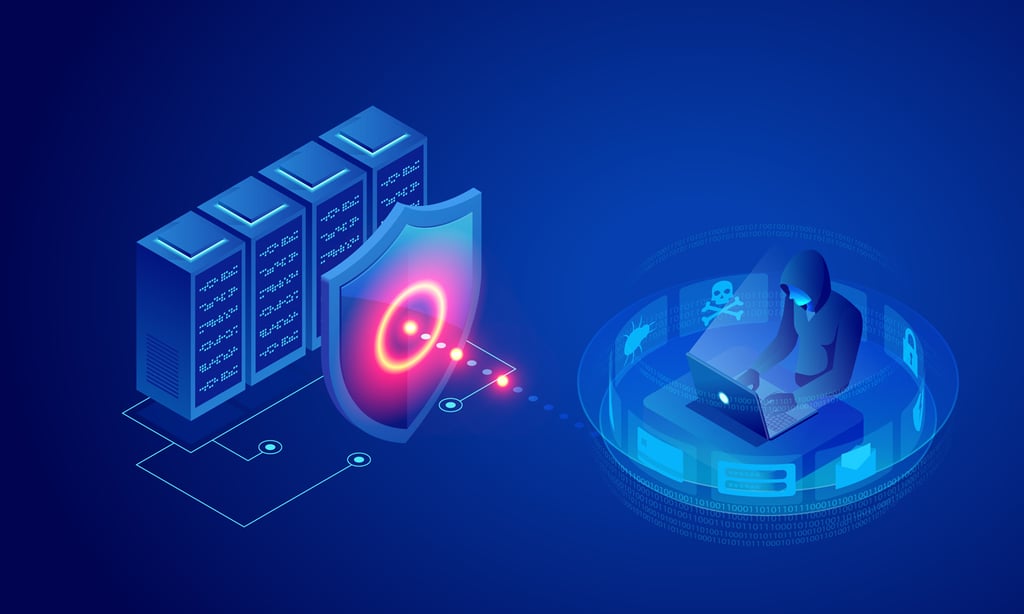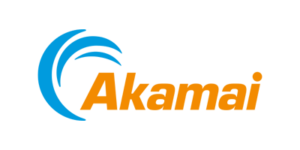
Hacker attacking server or database.
Distributed denial-of-service (DDoS) attacks are becoming a major issue for many businesses, from small and midsize to large enterprises. The size of the attack has also been on the rise, with attacks exceeding 2Tbps in size. Cloudflare reported a 15% quarter-on-quarter (QoQ) and a 67% year-on-year (YoY) increase in ransom DDoS attacks in Q3 2022. […]

Distributed denial-of-service (DDoS) attacks are becoming a major issue for many businesses, from small and midsize to large enterprises. The size of the attack has also been on the rise, with attacks exceeding 2Tbps in size. Cloudflare reported a 15% quarter-on-quarter (QoQ) and a 67% year-on-year (YoY) increase in ransom DDoS attacks in Q3 2022.
There was also a significant surge in Layer 3 and 4 DDoS attacks, with an increase of 97% YoY and a 24% QoQ. The most common targets of these attacks were the gaming industry, telecommunications, and information technology and services, including the software industry.
These industries are often targeted because they store data that can be sold on the black market, creating a new revenue stream for cyber criminals. With such high costs associated with DDoS attack protection, it is essential to find ways to reduce business exposure and minimize damage from this type of cyberattack.
However, not all DDoS protection service providers offer the same level of security or features. Businesses should carefully evaluate their needs before choosing one over another, weighing factors such as the cost of ownership of security controls against potential impacts if an attack is successful.
DDoS protection services are a form of cybersecurity that protects against DDoS attacks. A DDoS attack occurs when a third-party attempts to overwhelm the computer system(s) with fake requests, rendering the service unavailable to genuine users. There are various ways in which this can be done, such as by directing traffic from numerous sources towards the same target to overload it and cause it to become non-functional.
In some cases, there might be up to hundreds or even thousands of different sources, each transmitting data at high speeds and all competing for a response from the targeted machine. In other cases, attacks can be more targeted and use just one or two sources, although still at very high volumes.
DDoS protection services are an essential part of any business. They protect the network from being the victim of an attack that could disrupt enterprise service, steal customer data, or even destroy systems. The following is a list of the leading companies that offer DDoS protection service.

Cloudflare is a security and performance company that offers one of the market’s most popular DDoS protection tools. On average, the company serves 39 million HTTP requests per second and powers millions of websites, from small startups to large organizations, including IBM, Shopify, Zendesk, Lendingtree, and Doordash. Cloudflare acts as an intermediary between website visitors and a website’s server.
It can take care of all layers, including network-level attacks such as volumetric attacks or application-layer attacks such as a database, SQL injection, or cross-site scripting.

Akamai is a leading provider of security, cloud, and content delivery solutions. For over two decades, Akamai has delivered high-performance digital experiences on the internet. One of the many ways Akamai secures users’ experience is by protecting them from DDoS attacks. The company offers various DDoS protection solutions to help organizations defend against these attacks.
Akamai’s Prolexic product can detect malicious traffic patterns for enterprises looking to protect themselves. Scrubbing centers filter out attack traffic before it reaches its enterprise applications, data centers, and internet-facing infrastructure. Additionally, Akamai’s Prolexic boasts of 100% platform availability, time to mitigate, time-to-alert notification, time to respond, and individual time-to-mitigate service-level agreements (SLAs) based on specific attack vectors.

Google Cloud and Jigsaw developed Project Shield as a freemium service to secure qualified platforms such as news and independent journalists, human rights groups, election information and monitoring, political organizations, and eligible government agencies.
Those interested in using the platform must fill out an application and provide relevant information such as:

AWS Shield is a managed DDoS mitigation and monitoring service that can be used to protect applications running on AWS infrastructure. The tool offers dynamic detection and automatic inline mitigations. It provides active detection and automatic inline mitigations to reduce application downtime and latency.
The tool is available in two tiers: Standard and Advanced. AWS Shield Standard protects companies’ websites or apps against network and transport layer DDoS attacks. It also protects against all known infrastructure (Layer 3 and 4) attacks when used with Amazon CloudFront and Amazon Route 53. AWS Shield Advanced provides enhanced protection against attacks on Amazon Elastic Compute Cloud (EC2) applications, Elastic Load Balancing (ELB), Amazon CloudFront, AWS Global Accelerator, and Amazon Route 53 services.
AWS Shield Standard is free, and AWS Shield Advanced costs $3,000 per month per organization. Although, Amazon requires a 1-year subscription commitment from AWS Shield Advanced users.

Imperva is a leading provider of cybersecurity solutions, including web application firewalls (WAFs) and DDoS protection services. The company’s attack analytics solution provides on-demand visibility into cyber threats from Layer 3 and 4 to Layer 7.
It monitors network traffic patterns in real time to identify suspicious activity and protect against cyberattacks with 99.999% SLA availability for content delivery network (CDN), cloud WAF, and Domain Name System (DNS) protection. Imperva uses a global scrubbing network of 49 Points of Presence (PoPs) to block bad traffic while allowing legitimate traffic through.

Radware offers a suite of business-grade DDoS attack prevention and mitigation solutions. Their products are designed to protect against the most advanced attacks while providing maximum uptime and throughput without impacting application performance.
Radware has a global network of 16 scrubbing centers and 10Tbps mitigation capacity. The company also offers anti-DDoS training and certification programs to help educate businesses about how to combat these threats.

Link11 is a leading cybersecurity company focusing on infrastructure and web DDoS protection. This provider uses self-learning AI to analyze attack sequences and recognize the fingerprints of the attacker’s strategy, which can then block future attacks from the same source.
Link11’s infrastructure DDoS protection systems are designed to protect against any size DDoS attack. The system uses an autonomous global distributed scrubbing center architecture that fends off DDoS attacks on applications and services in a network. Its web DDoS protection is a core component of the Link11 web security suite and provides protection using the always-on principle.

AppTrana provides a fully managed web application firewall, API protection, DDoS protection, and bot management service. The platform is built on scalable AWS infrastructure to block large attacks up to 2.3Tbps and 700K requests per second with the ability to scale in the event of an attack. AppTrana provides unmetered DDoS attack protection and only charges users for legitimate traffic passed to their origin.

Neustar UltraDDoS Protect offers always-on, on-demand, hybrid, or on-premises solutions. They offer 15+ Tbps of DDoS mitigation bandwidth with guaranteed application performance and data availability.
Neustar uses a hybrid protection methodology to provide the fastest mitigation response possible while maximizing the system’s capacity to deal with more significant attacks. It provides on-premises hardware to mitigate more minor attacks and UltraDDos Protect for cloud when attack volume and complexity increase.

Founded in 2000, BlockDOS is an internet security company that offers 10Tbps+ and 150+ PoPs globally to provide practical solutions against all types of DDoS attacks with both prevention and mitigation techniques. With 24/7 year-round monitoring, BlockDOS boasts of 100% uptime availability and high-end performance. The service also provides multilayered protection to traffic filtering and routing services.
Choosing the right provider is a challenging task. There are many factors to consider, such as customer service, cost, reputation, and features. Some providers will be more suitable than others depending on what you need from your provider.
To make an educated decision when choosing your provider, it is essential to research your options before making a decision. You should also read reviews from people who have used the provider before to get a feel for how satisfied they were with their experience. You can find the best fit for your needs by doing this.
Before making your selection, you can also ask yourself some pre-qualification questions when shopping for the best DDoS protection services:
Answering these questions beforehand will help you pick a service with the essential features for your business needs.

Aminu Abdullahi is an experienced B2B technology and finance writer and award-winning public speaker. He is the co-author of the e-book, The Ultimate Creativity Playbook, and has written for various publications, including eWEEK, Enterprise Networking Planet, Tech Republic, eSecurity Planet, CIO Insight, Enterprise Storage Forum, IT Business Edge, Webopedia, Software Pundit, and Geekflare.

Enterprise Networking Planet aims to educate and assist IT administrators in building strong network infrastructures for their enterprise companies. Enterprise Networking Planet contributors write about relevant and useful topics on the cutting edge of enterprise networking based on years of personal experience in the field.
Property of TechnologyAdvice. © 2025 TechnologyAdvice. All Rights Reserved
Advertiser Disclosure: Some of the products that appear on this site are from companies from which TechnologyAdvice receives compensation. This compensation may impact how and where products appear on this site including, for example, the order in which they appear. TechnologyAdvice does not include all companies or all types of products available in the marketplace.